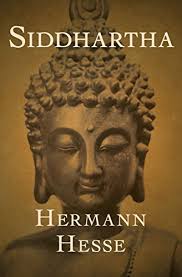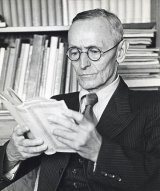Siddhartha Page #17
Siddhartha is a novel by Hermann Hesse that deals with the spiritual journey of self-discovery of a man named Siddhartha during the time of the Gautama Buddha. The book, Hesse's ninth novel, was written in German, in a simple, lyrical style.
Then, Siddhartha had spent the night in his house with dancing girls and wine, had acted as if he was superior to them towards the fellow-members of his caste, though this was no longer true, had drunk much wine and gone to bed a long time after midnight, being tired and yet excited, close to weeping and despair, and had for a long time sought to sleep in vain, his heart full of misery which he thought he could not bear any longer, full of a disgust which he felt penetrating his entire body like the lukewarm, repulsive taste of the wine, the just too sweet, dull music, the just too soft smile of the dancing girls, the just too sweet scent of their hair and breasts. But more than by anything else, he was disgusted by himself, by his perfumed hair, by the smell of wine from his mouth, by the flabby tiredness and listlessness of his skin. Like when someone, who has eaten and drunk far too much, vomits it back up again with agonising pain and is nevertheless glad about the relief, thus this sleepless man wished to free himself of these pleasures, these habits and all of this pointless life and himself, in an immense burst of disgust. Not until the light of the morning and the beginning of the first activities in the street before his city-house, he had slightly fallen asleep, had found for a few moments a half unconsciousness, a hint of sleep. In those moments, he had a dream: Kamala owned a small, rare singing bird in a golden cage. Of this bird, he dreamt. He dreamt: this bird had become mute, who at other times always used to sing in the morning, and since this arose his attention, he stepped in front of the cage and looked inside; there the small bird was dead and lay stiff on the ground. He took it out, weighed it for a moment in his hand, and then threw it away, out in the street, and in the same moment, he felt terribly shocked, and his heart hurt, as if he had thrown away from himself all value and everything good by throwing out this dead bird. Starting up from this dream, he felt encompassed by a deep sadness. Worthless, so it seemed to him, worthless and pointless was the way he had been going through life; nothing which was alive, nothing which was in some way delicious or worth keeping he had left in his hands. Alone he stood there and empty like a castaway on the shore. With a gloomy mind, Siddhartha went to the pleasure-garden he owned, locked the gate, sat down under a mango-tree, felt death in his heart and horror in his chest, sat and sensed how everything died in him, withered in him, came to an end in him. By and by, he gathered his thoughts, and in his mind, he once again went the entire path of his life, starting with the first days he could remember. When was there ever a time when he had experienced happiness, felt a true bliss? Oh yes, several times he had experienced such a thing. In his years as a boy, he has had a taste of it, when he had obtained praise from the Brahmans, he had felt it in his heart: "There is a path in front of the one who has distinguished himself in the recitation of the holy verses, in the dispute with the learned ones, as an assistant in the offerings." Then, he had felt it in his heart: "There is a path in front of you, you are destined for, the gods are awaiting you." And again, as a young man, when the ever rising, upward fleeing, goal of all thinking had ripped him out of and up from the multitude of those seeking the same goal, when he wrestled in pain for the purpose of Brahman, when every obtained knowledge only kindled new thirst in him, then again he had, in the midst of the thirst, in the midst of the pain felt this very same thing: "Go on! Go on! You are called upon!" He had heard this voice when he had left his home and had chosen the life of a Samana, and again when he had gone away from the Samanas to that perfected one, and also when he had gone away from him to the uncertain. For how long had he not heard this voice any more, for how long had he reached no height any more, how even and dull was the manner in which his path had passed through life, for many long years, without a high goal, without thirst, without elevation, content with small lustful pleasures and yet never satisfied! For all of these many years, without knowing it himself, he had tried hard and longed to become a man like those many, like those children, and in all this, his life had been much more miserable and poorer than theirs, and their goals were not his, nor their worries; after all, that entire world of the Kamaswami-people had only been a game to him, a dance he would watch, a comedy. Only Kamala had been dear, had been valuable to him--but was she still thus? Did he still need her, or she him? Did they not play a game without an ending? Was it necessary to live for this? No, it was not necessary! The name of this game was Sansara, a game for children, a game which was perhaps enjoyable to play once, twice, ten times--but for ever and ever over again? Then, Siddhartha knew that the game was over, that he could not play it any more. Shivers ran over his body, inside of him, so he felt, something had died. That entire day, he sat under the mango-tree, thinking of his father, thinking of Govinda, thinking of Gotama. Did he have to leave them to become a Kamaswami? He still sat there, when the night had fallen. When, looking up, he caught sight of the stars, he thought: "Here I'm sitting under my mango-tree, in my pleasure-garden." He smiled a little --was it really necessary, was it right, was it not as foolish game, that he owned a mango-tree, that he owned a garden? He also put an end to this, this also died in him. He rose, bid his farewell to the mango-tree, his farewell to the pleasure-garden. Since he had been without food this day, he felt strong hunger, and thought of his house in the city, of his chamber and bed, of the table with the meals on it. He smiled tiredly, shook himself, and bid his farewell to these things. In the same hour of the night, Siddhartha left his garden, left the city, and never came back. For a long time, Kamaswami had people look for him, thinking that he had fallen into the hands of robbers. Kamala had no one look for him. When she was told that Siddhartha had disappeared, she was not astonished. Did she not always expect it? Was he not a Samana, a man who was at home nowhere, a pilgrim? And most of all, she had felt this the last time they had been together, and she was happy, in spite of all the pain of the loss, that she had pulled him so affectionately to her heart for this last time, that she had felt one more time to be so completely possessed and penetrated by him. When she received the first news of Siddhartha's disappearance, she went to the window, where she held a rare singing bird captive in a golden cage. She opened the door of the cage, took the bird out and let it fly. For a long time, she gazed after it, the flying bird. From this day on, she received no more visitors and kept her house locked. But after some time, she became aware that she was pregnant from the last time she was together with Siddhartha.
Translation
Translate and read this book in other languages:
Select another language:
- - Select -
- 简体中文 (Chinese - Simplified)
- 繁體中文 (Chinese - Traditional)
- Español (Spanish)
- Esperanto (Esperanto)
- 日本語 (Japanese)
- Português (Portuguese)
- Deutsch (German)
- العربية (Arabic)
- Français (French)
- Русский (Russian)
- ಕನ್ನಡ (Kannada)
- 한국어 (Korean)
- עברית (Hebrew)
- Gaeilge (Irish)
- Українська (Ukrainian)
- اردو (Urdu)
- Magyar (Hungarian)
- मानक हिन्दी (Hindi)
- Indonesia (Indonesian)
- Italiano (Italian)
- தமிழ் (Tamil)
- Türkçe (Turkish)
- తెలుగు (Telugu)
- ภาษาไทย (Thai)
- Tiếng Việt (Vietnamese)
- Čeština (Czech)
- Polski (Polish)
- Bahasa Indonesia (Indonesian)
- Românește (Romanian)
- Nederlands (Dutch)
- Ελληνικά (Greek)
- Latinum (Latin)
- Svenska (Swedish)
- Dansk (Danish)
- Suomi (Finnish)
- فارسی (Persian)
- ייִדיש (Yiddish)
- հայերեն (Armenian)
- Norsk (Norwegian)
- English (English)
Citation
Use the citation below to add this book to your bibliography:
Style:MLAChicagoAPA
"Siddhartha Books." Literature.com. STANDS4 LLC, 2024. Web. 23 Nov. 2024. <https://www.literature.com/book/siddhartha_24>.




Discuss this Siddhartha book with the community:
Report Comment
We're doing our best to make sure our content is useful, accurate and safe.
If by any chance you spot an inappropriate comment while navigating through our website please use this form to let us know, and we'll take care of it shortly.
Attachment
You need to be logged in to favorite.
Log In